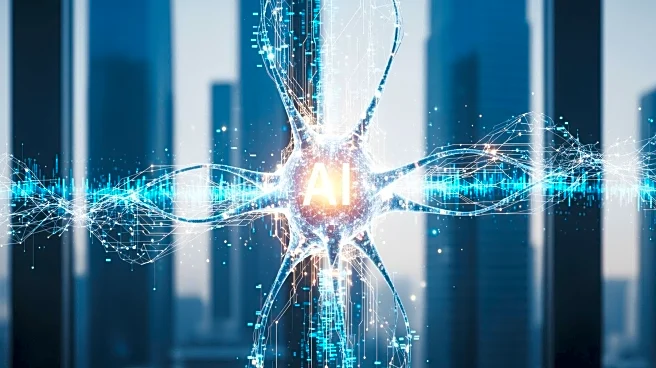What's Happening?
JPMorgan Chase and Goldman Sachs are integrating artificial intelligence into their operations, leading to a reduction in hiring despite a profitable year for Wall Street. JPMorgan reported a 12% increase
in profit to $14.4 billion in its third-quarter earnings, yet its head count rose by only 1%. The bank's management has been instructed to limit hiring as AI is deployed across various business functions. This strategic shift reflects a broader trend among major banks to leverage AI for efficiency, even as they experience significant revenue growth.
Why It's Important?
The adoption of AI by major banks like JPMorgan Chase and Goldman Sachs signifies a transformative shift in the financial industry. By reducing reliance on human labor, these institutions aim to enhance operational efficiency and cut costs. This move could have significant implications for employment in the sector, potentially leading to job displacement. However, JPMorgan CEO Jamie Dimon has indicated plans to retrain affected employees, suggesting a focus on workforce adaptation. The integration of AI could also set a precedent for other industries, influencing how businesses approach technology and labor management.
What's Next?
As JPMorgan Chase and Goldman Sachs continue to implement AI, the financial industry may see further changes in employment practices. The banks' strategies could prompt other financial institutions to adopt similar technologies, potentially accelerating the shift towards automation. Stakeholders, including employees and industry leaders, will likely monitor these developments closely, assessing the impact on job security and operational efficiency. Additionally, discussions around retraining and workforce adaptation may become more prominent as companies navigate the balance between technological advancement and human employment.
Beyond the Headlines
The integration of AI in banking raises ethical and cultural questions about the future of work. As technology replaces certain job functions, the industry must address concerns about job displacement and the need for retraining programs. This shift also highlights the growing importance of digital literacy and adaptability in the workforce. Long-term, the use of AI could redefine traditional banking roles, prompting a reevaluation of skills and career paths within the sector.









